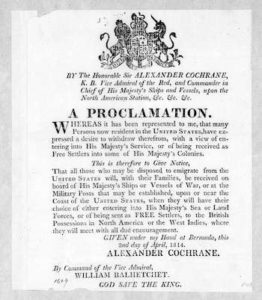
*The Alexander F. Cochrane Proclamation was issued on this date in 1814. The British decree invited Americans who wished to emigrate to join the British during the War of 1812. Although it did not explicitly mention enslaved Africans, it was taken by all as addressed to them.
The Cochrane Proclamation stated:
Whereas it has been represented to me that many Persons now resident in the United States have expressed a desire to withdraw therefrom with a view to entering His Majesty's service or of being received as free settlers into some of His Majesty's colonies. This is, therefore, to give notice that all persons who may be disposed to migrate from the United States will, with their families, be received on board of His Majesty's ships or vessels of war or at the military posts that may be established upon or near the coast of the United States, when they will have their choice of either entering into His Majesty's sea or land forces or of being sent as free settlers to the British possessions in North America or the West Indies where they will meet with due encouragement.
Given under my hand at Bermuda this second day of April 1814, by command of Vice Admiral Alex Cochrane'. Blacks who escaped slavery in the United States during the war settled in Nova Scotia, New Brunswick, and Trinidad. The term Black refugees in Canada refers to these settlers. They followed the Black Loyalists to flee American enslavement in wartime and settle in Canada. Other Africans who settled in Trinidad were generally from Virginia, Maryland, Georgia, and Spanish Florida via Bermuda, where they were evacuated on British ships from the East Coast.
Those Africans who bore arms for the British in the Second Corps of Colonial Marines, recruited from the younger of 4,000 refugees, settled in Trinidad in 1816, where they became known as the Merikins. Cochrane's proclamation did not mention enslaved people and was misinterpreted by some American slaveholders as motivation for violent revolt by their slaves.
To a limited extent, like the Black Loyalists, some of the Black refugees' names were recorded in a document called the Halifax List: Return of American Refugee Negroes who have been received into the Province of Nova Scotia from the United States of America between April 27, 1815, and October 24, 1818. This list took no account of the considerable number of Africans who had arrived earlier. Black refugees in Nova Scotia were first housed in the former prisoner-of-war camp on Melville Island.
After the War of 1812, it was an immigration facility. From Melville Island, they moved to settlements around Halifax and in the Annapolis Valley. These settlements were licensed property for the refugees entering Nova Scotia. While it wasn't land they owned utterly, it allowed the refugees to start their own communities. The passengers on the shipwrecked HMS Atalante (1808) included twenty American refugee enslaved people from the James River in Virginia. They were among the first Black Refugees of the War of 1812 to reach Canada.
An estimated 10,000 to 30,000 refugees arrived individually or in small family groups during the antebellum years, seeking freedom from slavery along the Underground Railroad from the United States. Many Black refugees settled in North and East Preston, Nova Scotia, where their descendants still live. Many other Black refugees settled in smaller communities, such as Hammonds Plains, Beechville, Windsor, and communities throughout Nova Scotia's Annapolis Valley. Some Black refugee families moved closer to Halifax for employment opportunities in the 1840s, forming the Halifax community of Africville.
The migration included the religious leader and abolitionist Richard Preston, who established the first African Baptist Church in Halifax, and the parents of William Hall, one of Canada's first winners of a Victoria Cross. The Black refugees in Nova Scotia were mainly from Virginia and Maryland and brought basket-making skills from the Chesapeake Region. Their descendants still practice these. These baskets are very distinct in style from the existing Mi'kmaw and Acadian basket-making styles by other ethnic groups in the region.